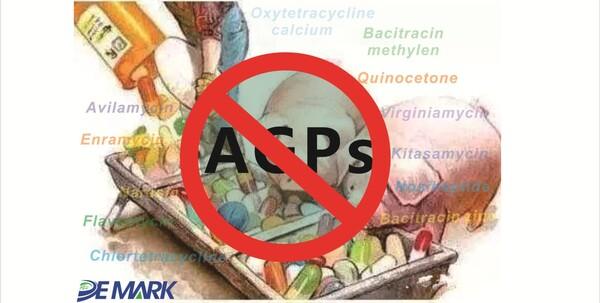
Content sponsored by:
Hangzhou DE Mark Industrial Co Ltd
How New Agps-Ban regulation impact Feed and Husbandry Industry
Published: July 17, 2020
By: Ronnick FONG, Executive Director, Hangzhou DE Mark Industrial Co Ltd.

The Ministry of Agriculture and Rural Affairs announced No. 194 decree that, starting from July 1, 2020, feed production enterprises stop producing commercial feed containing growth-promoting drug(s) (except traditional Chinese medicine).
The antibiotic ban in animal feed is a requirement, a challenge, yet an opportunity as well. It is about to start a new journey of green development in the feed industry, it pushes a certain reform in the domestic farming industry.
No longer permitted addition of antibiotic growth-promoting drugs (AGPs) in the feed, the people will seek some alternatives or substitutes such as Chinese veterinary drugs or plant extracts, which will have a certain impact on the cost of feed production. Whether the cost is increased or reduced is dependence upon the specific situation. However, at the end of June, massive feed enterprises raised feed prices ranging 50-100 yuan/MT with a statement to the effect that price increase of feed energy raw materials corn, bran, broken rice and, etc. superimposed with 01-July-launched AGPs free formula, making feed costs rise. Is this fishing in troubled water, or does it actually affect feed prices?
Livestock breeding industry, as the downstream of the feed industry, after AGPs ban, animal growth, especially disease prevention and control in large-scale farms will undoubtedly face a certain degree of challenges. For example, "The addition of antibiotics to pig feed is widespread, when African swine fever (ASF) is still there, as pigs are relatively in poor immunity, the addition of antibiotics is just to improve the survival rate of pigs. If (AGPs) not added, it is certainly beneficial from a food safety perspective, but from a farming point of view, it may make it more difficult in breeding for farming enterprises. After the AGPs ban, feed costs, even if increase, the magnitude will not be so obvious, the impact in the short term is mainly reflected in the pig immunity." (Lily Zhang, industry analyst at ZhuoChuang Pig)
In case the breeding biosecurity system is done better in a farm, the farm itself has certain ability to prevent and control the diseases, this antibiotics ban is putting forward a higher demand for its breeding level. But for those small and medium sized enterprises (SMEs) whose management level is not so good, it may reduce the survival rate.
After the antibiotics ban policy, the pig breeding put forward a higher demand, in the provenance, feed, animal body and breeding environment, to strengthen management, to take comprehensive technical measures. As a result, it is very possible to drive pig production capacity to further tilt towards the enterprises of higher management level and stronger core competitiveness.
However, whether feed production enterprises or animal husbandry enterprises, they still lack mature solutions for antibiotics removal and antibiotics alternative.
We must strengthen scientific and technological innovation in accelerating the research and development of new green feed additives such as natural plant extracts, microorganisms and enzyme preparations, and strengthen the coordination of production, research and development to actively promote the application of comprehensive alternatives and substitute for AGPs as feed additives.
Related topics:
Authors:
Hangzhou DE Mark Industrial Co Ltd
Recommend
Comment
Share

Would you like to discuss another topic? Create a new post to engage with experts in the community.
